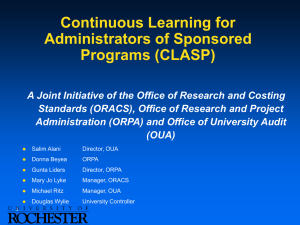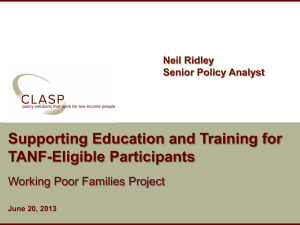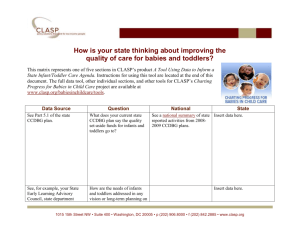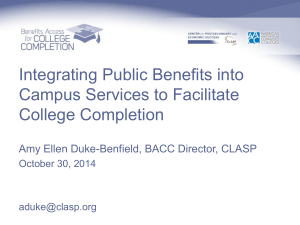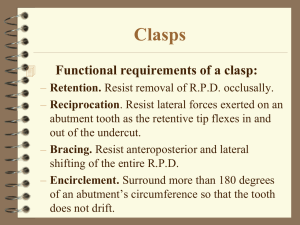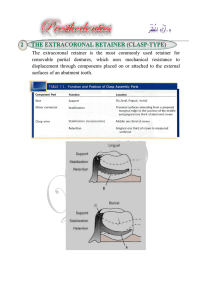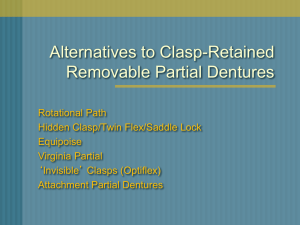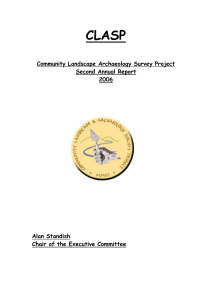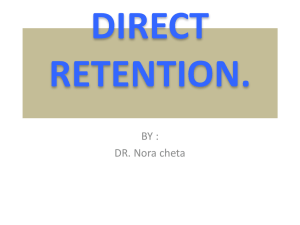Chicago-Thursday-TANF-Case-management-and-coaching
advertisement
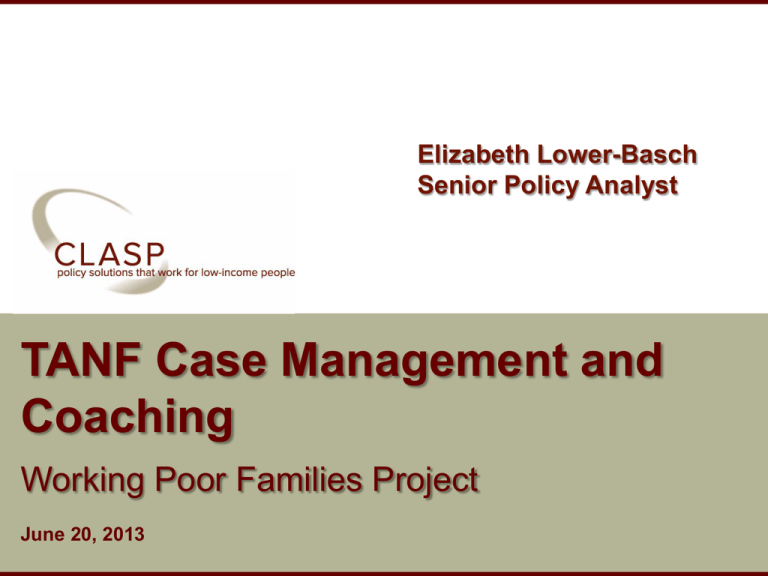
Elizabeth Lower-Basch Senior Policy Analyst TANF Case Management and Coaching Working Poor Families Project June 20, 2013 www.clasp.org • Can support wide range of case management and coaching services aimed at work, marriage, and self-sufficiency. • Not limited to families receiving cash assistance. • Can be in house or contracted out to other entities www.clasp.org 2 • Initial and ongoing assessment • Employment and service planning • Linking clients to in-house and community services • Motivating, encouraging, and supporting engagement • Individualized soft-skills training/coaching • Monitoring and verifying program participation • Reengaging nonparticipants/initiating sanctions M. Derr, Integrating Comprehensive Case Management Strategies into TANF Programs, May 2013 www.clasp.org 3 • High caseloads/workloads • e.g. Oregon www.clasp.org 4 • High caseloads/workloads • Accessing activities and supports in an era of limited resources • Strong focus on monitoring work participation Time consuming Different skill set than “social work” Threat of sanction may lead to hostile relationships between participants and staff • High turnover of caseloads www.clasp.org 5 • A different approach…. www.clasp.org 6 • Technology • Specialized staff • Focus on particular populations or programs • Broader redesign www.clasp.org 7 • Automated systems to reduce time spent in documenting and verifying participation • Computerized assessment and case management systems (OWRA) • Data sharing across programs – do the same clients show up in homelessness, child welfare, mental health, job training program? www.clasp.org 8 www.clasp.org 9 • Need to match role expectations and caseworker skills Can’t afford and don’t want to ask social workers to monitor work participation. But not reasonable to ask low-paid caseworkers with little skills, experience to take on social work www.clasp.org 10 • • • • • • • • • • • • • • • Verbal and written communication; Active listening; Conflict resolution; Ability to be non-judgmental; Time management; Adaptability; Sensitivity; Problem solving; Crises response; Interviewing skills; Discussion facilitation; Customer service; Job matching; Safe confrontation; Assertive communication; www.clasp.org • • • • • • • • • • • • • Networking; Problem identification; Solution recognition; Service coordination; Appropriate feedback; Coaching and mentoring; Budget preparation; Cultural competency; Interpreting formal assessment results; Ability to put into place needed modifications and accommodations; Goal setting; Career development; and Job retention strategies. Source: W-2 Manual 11 • Utah – MSW’s available as resources Conduct clinical and functional ability assessments; Offer crisis intervention and clinical case management; and Make referrals to mental health treatment providers. • Kentucky Targeted Assessment Program Serves TANF and child welfare referrals Provides assessment, referral, pre-treatment, service coordination and follow-up services Uses Motivational Interviewing and Strengths-Based Case Management www.clasp.org 12 • Montgomery County, MD, triage workers Identify high needs clients at initial intake • Minnesota Integrated Service Projects Served primarily long-term, multiple barrier clients Mixture of team staffing and individual case management with small caseloads Mostly focused on brokering services • SSI advocacy Provides functional assessments, help with SSI application and appeals www.clasp.org 13 • Short-term intensive coaching built into job readiness/job search programs • Kentucky Ready to Work Coordinators Located on campus Dual role of documenting work participation and providing case management • Minnesota Navigators under Career Pathways Based in community organizations or one-stop centers Focused on recruiting and assisting TANF recipients and working with basic skills and college instructors www.clasp.org 14 • Meaningless to do enhanced assessment, or have clients pick own goals if everyone is assigned to same activity • Allow flexibility in activities Tiered service approaches being developed in DC, Washington state • Document gaps in service capacity to advocate for expansions www.clasp.org 15 www.clasp.org 16 For more information: Elizabeth Lower-Basch elowerbasch@clasp.org 202 906-8013 www.clasp.org 1200 18th St, NW Suite 200 Washington, DC 20036 www.clasp.org 17
